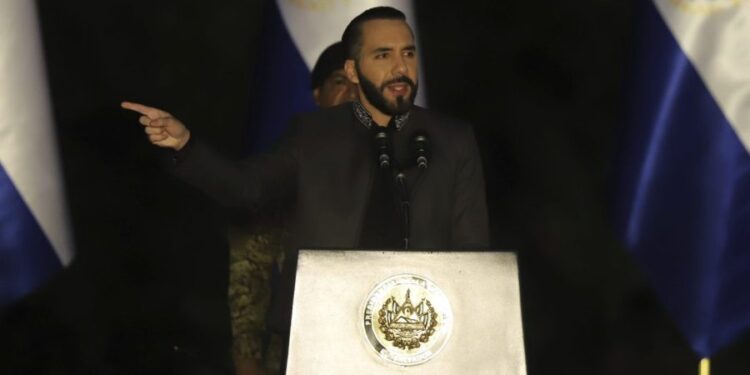President Nayib Bukele of El Salvador is visiting President Trump at the White House today. Major topics on the agenda could include migration, security, Bitcoin and even a big announcement regarding nuclear power generation.
The timing couldn’t be better, coming just after the Supreme Court ruled to uphold the decision to deport alleged Venezuelan gang members under the Alien Enemies Act of 1798. This colossal victory for Trump’s immigration policy would not have been possible without the unconditional support of El Salvador’s president.
Bukele changed the narrative, flipped the script, altered the order of things and set a new precedent. This small Central American country extended its hand to the U.S. not to ask for help, but to help address the national emergency caused by illegal migration. Bukele offered Trump El Salvador’s Center for the Confinement of Terrorism prison as an alternative to receive members of the Tren de Aragua cartel of Venezuela and other highly dangerous criminals.
Bukele is not just offering a mega-prison. El Salvador is offering a successful security model that has sparked U.S. interest due to its massive results turning one of the most dangerous countries in the world into the safest nation in the Western hemisphere. The peace and tranquility felt in El Salvador surpasses that of many cities in the U.S. and around the world. A heavy-handed model that contrasts with “humanist” laws that do not punish theft, drug use or even trespassing.
Bukele’s visit could bring important announcements regarding the fight against illegal immigration, drug trafficking, the deportation of MS-13 gang members, greater cooperation in the use of new technologies and biometric analysis, among others.
The second major topic on the agenda could be linked to the use of Bitcoin and cryptocurrencies. In 2021, El Salvador became the first country in the world to adopt Bitcoin as legal tender. In recent days, Trump expressed interest in continuing to facilitate the use of cryptocurrencies, promoting deregulation and even creating a digital asset reserve.
Investments in El Salvador could be another important topic. El Salvador, whose economy has historically depended on remittances from citizens living abroad — totaling $8.4 billion in 2024 — is seeking to pivot under Bukele’s leadership, promoting technology companies, industry and particularly tourism. In this regard, El Salvador knows that job creation is key to reducing migration and generating prosperity.
Renewable energy and nuclear power are also key issues. During Secretary of State Marco Rubio’s visit, the U.S. expressed interest in cooperating for the development of nuclear energy in El Salvador. The country also has significant potential for generating geothermal energy from the heat of volcanoes, an issue that has been one of the hallmarks of the Bukele administration.
Bukele’s visit also marks an important shift by the U.S. toward its backyard, with a clear focus on security. A few days ago, Secretary of Defense Pete Hegseth traveled to Panama, where he participated in the Central America Security Conference, highlighting the importance of reactivating American military bases in Panama and eliminating Chinese influence. Secretary of Homeland Security Kristi Noem recently traveled to Mexico, El Salvador and Colombia, addressing migration, transnational crime and drug trafficking.
The Trump administration is resetting and reestablishing its leadership in Latin America as a priority for foreign policy and national security. It is establishing alliances and ensuring a strong presence, power and partnerships to curb China’s unchecked advance in the region.
The U.S. is back, and this means security, stability and prosperity for America and the entire continent.
Arturo McFields is an exiled journalist, former Nicaraguan ambassador to the Organization of American States, and a former member of the Norwegian Peace Corps. He is an alumnus of the National Defense University’s Security and Defense Seminar and the Harvard Leadership course.







